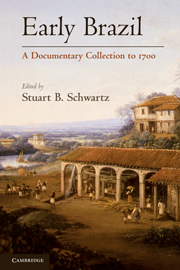Book contents
- Frontmatter
- Contents
- Preface
- A Note on Translation
- A Note on Portuguese Currency, Weights, and Measures
- Maps
- 1 The “Discovery” and First Encounters with Brazil
- 2 The Donatarial System
- 3 Royal Government
- 4 The French Interlude
- 5 Indians, Jesuits, and Colonists
- 6 The World of the Engenhos
- 7 Government and Society in Dutch Brazil
- 8 Burdens of Slavery and Race
- 9 Public and Private Power
- 10 Religion and Society
- 11 Frontiers
- Index
9 - Public and Private Power
Published online by Cambridge University Press: 05 June 2012
- Frontmatter
- Contents
- Preface
- A Note on Translation
- A Note on Portuguese Currency, Weights, and Measures
- Maps
- 1 The “Discovery” and First Encounters with Brazil
- 2 The Donatarial System
- 3 Royal Government
- 4 The French Interlude
- 5 Indians, Jesuits, and Colonists
- 6 The World of the Engenhos
- 7 Government and Society in Dutch Brazil
- 8 Burdens of Slavery and Race
- 9 Public and Private Power
- 10 Religion and Society
- 11 Frontiers
- Index
Summary
In theory, the Brazilian colony was governed from Lisbon by centralized royal authority vested in governors, magistrates, and other royal officials, but the earlier system of donatary captains had remained in place in some regions, and local government was often controlled by the municipal councils of the port cities. Thus, powerful individuals, families, and interest groups such as the sugar planters or the merchants often exercised considerable influence on government and the law. The growth of the colony's population and its burgeoning economy in the later sixteenth century had created a number of challenges for the administration of justice. Municipal magistrates and a royal judge sent in 1549 were not able to keep up with the increasing amount of litigation and the prosecution of crime. After an aborted attempt in 1588, a royal court of appeals (Relação) with ten judges (desembargadores) was established in 1609. Its judges not only enforced the law but also made and interpreted legislation and served the governor in an advisory role, as well as taking on other administrative functions. Competing authorities such as the bishops or the donataries resented the proximity and power of the High Court, and so, in the aftermath of the Dutch seizure of Salvador (1624–5), pressure was brought on the Crown to abolish the High Court. It was abolished in 1626 and not reinstituted until 1652. The following anonymous document laments the court's demise and reveals the inequities and continuing problems in the judicial system.
(From Biblioteca Nacional de Lisboa, Colecção Pombalina 647, fols. 69–72).Arguments of the Inhabitants of Bahia against the Suppression of the High Court (1626)
His Majesty has the responsibility of ensuring that his subjects are treated justly. Yet there was [formerly] no justice in the State of Brazil, nor could there be, as there was only one senior Crown judge. After taking detailed advice, the very Catholic and prudent King Philip, the first king of Portugal to bear that name, ordered that there should be established a High Court in Brazil. To that end, he twice sent learned judges out to these Indies.
Driven by the same pressing need and sense of duty, His Majesty's father sent a High Court to this country in 1609. It was very effective and, owing to its establishment on the basis of sound advice, it frustrated the intention of the bishops and of others to suppress it. Their object was to promote their own personal interests, without regard for the public good. Hiding behind a mask of private greed, they even argued that for reasons of State, the High Court was unnecessary in Brazil. Out of respect for the aforesaid former sovereign, it seems right that it should be kept in being, all the more so because without a High Court, justice cannot be administered, and the State would collapse in chaos.
- Type
- Chapter
- Information
- Early BrazilA Documentary Collection to 1700, pp. 271 - 278Publisher: Cambridge University PressPrint publication year: 2009

